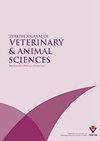DMEM and FBS as thawing solutions for frozen semen of pigs can improve sperm motility and sow reproductive performance
IF 0.6
4区 农林科学
Q4 VETERINARY SCIENCES
引用次数: 0
Abstract
The purpose of this experiment was to investigate the effects of Beltsville thawing solution BTS , Androhep, and Dulbecco?s modified Eagle medium + Fatal bovine serum D-F as diluents of frozen semen on sperm motility and sow reproductive performance. In experiment 1, boar semen was collected and diluted to 2.0 × 109/60 mL, 1.5 × 109/60 mL, and 1.5 × 109/40 mL with Androhep. The appropriate semen dose was determined by postcervical insemination. In experiment 2, boar semen was fumigated with liquid nitrogen and thawed semen was diluted to 1.5 × 109/40 mL with D-F, Androhep, and BTS, respectively. The effects of above diluents on sperm motility and sow reproductive performance were studied by postcervical insemination. The appropriate semen dose for postcervical insemination was 1.5 × 109/40 mL. After thawing of frozen semen, sperm motility of semen diluted with D-F was significantly higher than that of semen diluted with Androhep and BTS. There was no significant difference in pregnancy rates among sows via artificial insemination. The litter size of sows using D-F diluted semen was significantly higher than that of sows using Androhep and BTS diluted semen. In conclusion, D-F freezing diluent can improve sperm motility of frozen boar semen after thawing, prolong sperm survival time, and increase sow reproductive performance.DMEM和FBS作为猪冷冻精液解冻液,可以提高精子活力和母猪繁殖性能
本实验旨在探讨Beltsville解冻液BTS、Androhep和Dulbecco?s改良Eagle培养基+致命牛血清D-F作为冷冻精液稀释剂对精子活力和母猪繁殖性能的影响。试验1收集公猪精液,用Androhep稀释至2.0 × 109/ 60ml、1.5 × 109/ 60ml和1.5 × 109/ 40ml。通过子宫颈后人工授精确定合适的精液剂量。试验2用液氮熏蒸公猪精液,解冻后的精液分别用D-F、Androhep和BTS稀释至1.5 × 109/40 mL。通过子宫颈后人工授精研究了上述稀释剂对母猪精子活力和繁殖性能的影响。经冷冻精子解冻后,经D-F稀释后的精子活力显著高于经Androhep和BTS稀释后的精子活力。人工授精母猪的受孕率无显著差异。使用D-F稀释精液的母猪产仔数显著高于使用Androhep和BTS稀释精液的母猪。综上所述,D-F冷冻稀释液能提高冷冻猪精液解冻后的精子活力,延长精子存活时间,提高母猪繁殖性能。
本文章由计算机程序翻译,如有差异,请以英文原文为准。
求助全文
约1分钟内获得全文
求助全文
来源期刊
CiteScore
1.30
自引率
0.00%
发文量
57
审稿时长
24 months
期刊介绍:
The Turkish Journal of Veterinary and Animal Sciences is published electronically 6 times a year by the Scientific and Technological Research Council of Turkey (TÜBİTAK).
Accepts English-language manuscripts on all aspects of veterinary medicine and animal sciences.
Contribution is open to researchers of all nationalities.
Original research articles, review articles, short communications, case reports, and letters to the editor are welcome.
Manuscripts related to economically important large and small farm animals, poultry, equine species, aquatic species, and bees, as well as companion animals such as dogs, cats, and cage birds, are particularly welcome.
Contributions related to laboratory animals are only accepted for publication with the understanding that the subject is crucial for veterinary medicine and animal science.
Manuscripts written on the subjects of basic sciences and clinical sciences related to veterinary medicine, nutrition, and nutritional diseases, as well as the breeding and husbandry of the above-mentioned animals and the hygiene and technology of food of animal origin, have priority for publication in the journal.
A manuscript suggesting that animals have been subjected to adverse, stressful, or harsh conditions or treatment will not be processed for publication unless it has been approved by an institutional animal care committee or the equivalent thereof.
The editor and the peer reviewers reserve the right to reject papers on ethical grounds when, in their opinion, the severity of experimental procedures to which animals are subjected is not justified by the scientific value or originality of the information being sought by the author(s).

 求助内容:
求助内容: 应助结果提醒方式:
应助结果提醒方式:


